
Boris Fyodorovich Godunov ruled the Tsardom of Russia as de facto regent from c. 1585 to 1598 and then as the first non-Rurikid tsar from 1598 to 1605. After the end of his reign Russia descended into the Time of Troubles.
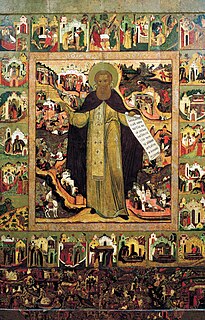
Venerable Sergius of Radonezh, also transliterated as Sergey Radonezhsky or Serge of Radonezh, was a spiritual leader and monastic reformer of medieval Russia. Together with Venerable Seraphim of Sarov, he is one of the Russian Orthodox Church's most highly venerated saints.

Saint Alexius was Metropolitan of Kiev and all Russia, and presided over the Moscow government during Dmitrii Donskoi's minority.
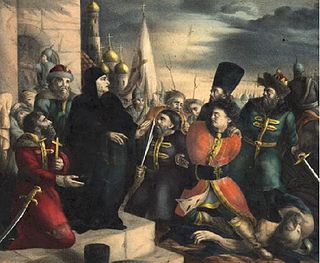
Maria Feodorovna Nagaya was a Russian tsaritsa and fifth uncanonical wife of Ivan the Terrible.

Job, also known as Job of Moscow was the first Patriarch of Moscow and All Russia and is a saint of the Orthodox Church.
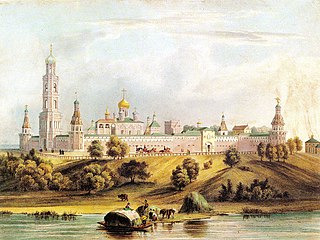
Simonov Monastery in Moscow was established in 1370 by monk Feodor, a nephew and disciple of St Sergius of Radonezh.
Ivan Mikhailovich Viskovatiy (Viskovatov) was a Russian diplomat and head of the Posolsky Prikaz.

March 30 - Eastern Orthodox liturgical calendar - April 1

Saint Philip II of Moscow was a Russian Orthodox monk, who became Metropolitan of Moscow during the reign of Ivan the Terrible. He was one of a few Metropolitans who dared openly to contradict royal authority, and it is widely believed that the Tsar had him murdered on that account. He is venerated as a saint and martyr in the Eastern Orthodox Church.
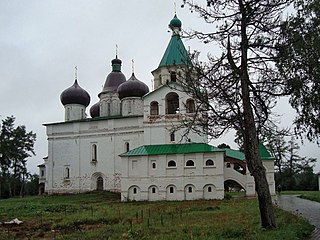
Antonievo-Siysky Monastery is a Russian Orthodox monastery that was founded by Saint Anthony of Siya deep in the woods, 90 km to the south of Kholmogory, in 1520. Currently the monastery is located in Kholmogorsky District of Arkhangelsk Oblast in Russia, inside the nature protected area, Siysky Zakaznik.

Maximus the Greek, also known as Maximos the Greek or Maksim Grek, was a Greek monk, publicist, writer, scholar, and translator active in Russia. He is also called Maximos the Hagiorite, as well as Maximus the Philosopher.

Macarius was a notable Russian cleric, writer, and icon painter who served as the Metropolitan of Moscow and all Russia from 1542 until 1563.

The Tsardom of Russia, or the Tsardom of Muscovy, was the centralized Russian state from the assumption of the title of Tsar by Ivan IV in 1547 until the foundation of the Russian Empire by Peter the Great in 1721.

Venerable Abraham Galitzki or Abramius of Galich or Chukhlomsky and Gorodetsky was an abbot of the Russian Orthodox Church.

Irina Feodorovna Godunova later Alexandra (1557–1603) was a Tsaritsa of Russia by marriage to Tsar Feodor I Ivanovich and the sister of Tsar Boris Godunov. For nine days after the death of her spouse in 1598, she upheld a dubious power position as de facto autocrat.
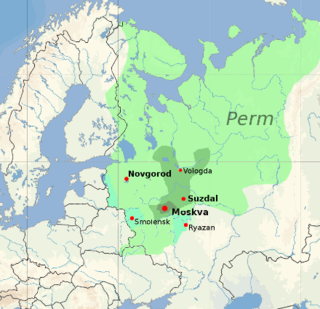
The Grand Duchy of Moscow, Muscovite Rus' or Grand Principality of Moscow was a Rus' principality of the Late Middle Ages centered around Moscow, and the predecessor state of the Tsardom of Russia in the early modern period.

Troitse-Scanov Convent is a Convent in the Penza Oblast of Russia. It is located 4 km (2.5 mi) from the district center Narovchat. Its architecture demonstrates the transition from baroque to classicism.
Boyar scions were a rank of Russian gentry that existed from the late 1300s through the 1600s. In the late 1700s—early 1800s descendants of the boyar scions who failed to prove nobility or regain it through the Table of Ranks were enrolled within the social group named odnodvortsy.
Bishop Luke is an American church leader. He serves as bishop of the Russian Orthodox Church Outside Russia, current abbot of Holy Trinity Monastery, rector, associate professor of patrology of Holy Trinity Orthodox Seminary in Jordanville, New York, and auxiliary bishop of Syracuse, New York.

















